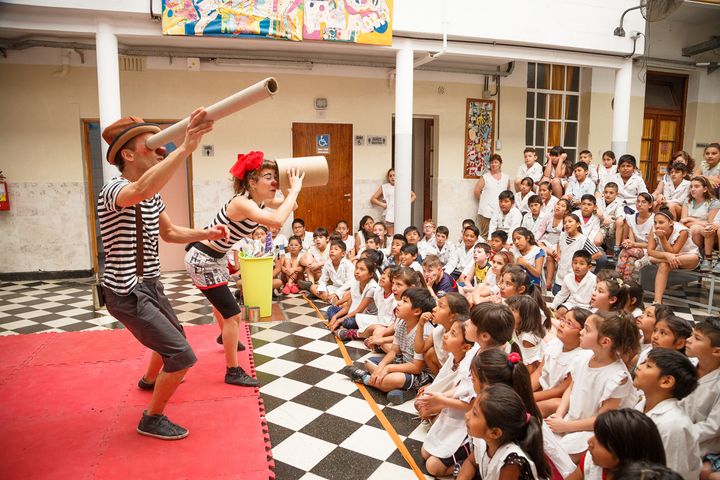 A Circus Where Clowns Teach How to Recycle
A Circus Where Clowns Teach How to RecycleA couple of clowns hop onto a stage full of garbage. Looking clueless, they stare at newspapers, plastic bottles and milk cartons scattered everywhere. With help froman audience of schoolchildren who answer their questions and applaud their actions, the clowns manage to separate the different kinds of waste. The scenery, costumes and props, all made of recycled materials, help the artists of Circo Reciclado ("Recycled Circus" in Spanish) educate children about the environment and teach them to recycleby performing shows across Argentina.
"Environmental protection is a matter of education. People do not pollute because they are evil, but because they are unaware. That's why we work with children; Earth's future depends on everyone," says Diego Brailovsky, founder of the group, which combines art and social impact.

The main show in the circus's repertoire is "Reduzco, reúso, recirco" ("Reduce, Reuse, Recircus" in Spanish), an interactive play the groupgenerally performs in kindergartens and primary schools. "When we arrive at the schools, children smile. The show lasts about 45 minutes and they learn and have fun from beginning to end," says Brailovsky, age 35. "Educational institutions are usually very structured. We deal with a very serious issue in an unstructured way."
Since the group's creation in 2012, it has performed in about 400 educational institutions for more than 45,000 students. "It is important to introduce these concepts while they are young, so that they integrate and commit to them," says the project's founder. And although adults can also enjoy the show, since the circus performs in companies and public spaces, Brailovsky says they tend to be less motivated than children when it comes to taking action. "Whenever adults are asked if they recycle, they start coming up with excuses. And this is an issue that requires urgent action," he stresses.
According to Waste Management World magazine, Argentina is the second Latin American countryin terms of waste generation per capita (1.2 kg/day), behind Mexico, which has a population nearly three times as large. And yet,a study conducted by the Faculty of Engineering of the University of Buenos Aires (Fiuba) and the Ecological Coordination Metropolitan Area State Society (Ceamse) claims that 78 percent of the country's waste could be recycled if it was properly separated. Today, only 56 percentis recovered.
Principals and teachers respond to Circo Reciclado's shows with enthusiasm, seeing its playful way of transmitting environmental knowledge as a great educational tool for a topic that is viewed as increasingly urgent.
Brailovsky noticed this paradigm shift in early 2012, while traveling in New Zealand with a fellow circus artist and friend. "I was walking through landscapes that were incredible and I didn't understand how some people could leave litter behind. It wasn't much, but I was shocked to see how it polluted the environment. That's when I decided to do something to combine my two great passions: the circus and nature," he recalls.

The duo then created an English-speaking show, "Recycling Circus," which they presented in 85 elementary schools during the eight months of their stay in the country. Upon their return to Argentina they were determined to continue the project, but Brailovsky discovered a different reality. "In the beginning, it was very difficult for us to carry on. In 2013, when you spoke to students and teachers about separating waste, they had no idea what you were talking about. I had to take two steps back and rethink how to make the show from scratch," he says.
Today, the circus's repertoire not only covers ecological matters, but social issues, too, in coordination with Carolina Crevecoeur, a teacher and clown. They perform more than 70 shows a year, withthe support of 10 artists from different disciplines: jugglers, acrobats, musicians and actors.
CircoReciclado will soon premier two new projects, one focused on water protection and the other on electronic waste. But Brailovsky's big dream is to create offshoots of his company around the world. "In addition to Argentina and New Zealand, we toured Uruguay, Bolivia and Spain. We had a great response from the kids, everywhere. Clearly, the ideas are conveyed better through a show than a speech," he says.
He believes that environmental education has grown remarkably over the past decade, although our ecological emergency still exists and requires everyone's commitment. "You don't have to be a scientist to realize it, just look at the latest weather phenomena or how all the seasons are becoming more and more unpredictable," he says, and concludes: "Wherever we are, we can all do something, no matter how big or small. Many small actions make something bigger."
This article is being published as part of Earth Beats, an international and collaborative initiative gathering 18 news media outlets from around the world to focus on solutions to waste and pollution.
